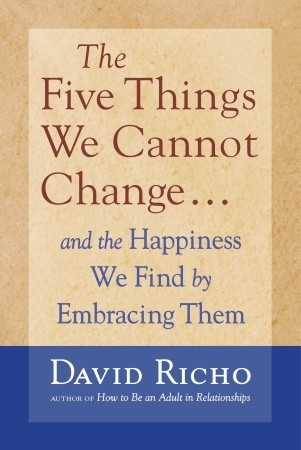The Big Ideas
- There are five inescapable “givens” of human experience: things change; chaos happens; things aren’t always fair; life can be painful; and people behave badly.
- Struggling against the givens leads to disappointment, frustration, and sadness.
- Embrace the givens with an unconditional “yes,” and the givens become life lessons.
- For every given—which appears negative—there is a corresponding positive grace or gift that can arise.
Neutrino’s Nutshell
The book encompasses five “givens” along with the author’s suggestion of how to handle them.
1. Everything changes and ends.
What begins must end. Change often feels like a loss which results in sadness or anger. Change provokes us to tighten controls in our life, yet these attempts to control change can lead to suffering. The opposite of control is the act of yielding to change. Rather than trying to dig our heels in and block the force of a river sweeping past, we can float to the top and let the water carry us wherever it will go.
2. Things do not always go according to plan.
Life doesn’t follow our expectations. When the unexpected happens, we get angry or discouraged. The healthiest response to chaos, however, is humility. We cannot know everything there is to know about a situation or how life will pan out.
3. Life is not always fair.
You win some, you lose some. Sometimes we get hurt even when we’re careful; sometimes we do everything we can, but it isn’t enough. To focus emotionally on the unfairness of life could cause us to become bitter or self-pitying. In contrast, if we say “yes” to life’s unfairness, we will be able to use difficult circumstances as an opportunity to grow beyond our initial limitations. If a person has directly caused us pain, we can choose to let go of what has happened and move forward.
4. Pain is part of life.
Suffering is inevitable. Pain isn’t punishment; it is an equal opportunity occurrence. As individuals, we experience varying types and degrees of pain, but we all suffer in some way or another. One common response to pain is creating a mental block or wall against the possibility of future pain. For example, if we suffer heartbreak from a failed romance, we decide never to love again; if we lose money in an investment, we obsess over every penny and refuse to take financial risks. However, when we choose to let go of pain and move forward, our hearts remain open to anything that might come our way in the future. We can better serve the world, and ourselves, when we are in touch with our human vulnerability.
5. People are not loving and loyal all the time.
People sometimes lie, betray, or hurt others—even those they love and trust. At times, we are the ones who lie, betray, or hurt others. Our reaction to this unexpected behavior may be to blame or to ask why the event is occurring. What if, instead, we echoed the Buddhist saying, “This being the case, how shall I proceed?” We can let the emotions of the moment pass through us, and then move on.
Quotables
“Yes is the brave ally of serenity; no is the scared accomplice of anxiety. We find help in saying yes and in facing the givens through mindfulness—that is, through fearless and patient attention to the present moment.”
IMEO (In My Eudaimonion Opinion)
This book effectively summarizes the life experiences that either haunt us or allow us to grow, depending on our response. I found this book to be more telling of how things “ought” to be rather than what you can actually “do” to change your perspective. That said, there are some truisms in the book.
Take Action, Humanoid!
Choose one or more of the following statements to put in a prominent place in your home, and read it aloud at least once every day.
- I accept that everything will change and end. I rejoice in witnessing the transformation that happens in each moment.
- The people I love are companions on this journey. We will help each other along the path, but we are not responsible for meeting each other’s needs.
- Whenever I can, I show kindness and respect to all beings—not because I expect a reward, but because I acknowledge the vulnerability of each person, including myself.
The Deets
The Five Things We Cannot Change and the Happiness We Find By Embracing Them
Author: David Richo, Ph.D., M.F.T.
Publication date: 2005 (237 pages)

I love the idea of embracing the “givens” rather than struggling against them. Struggling against something that’s inescapable is so exhausting and ineffective, especially when not struggling gives us the opportunity to learn something. Also, I have to say that I love the “Take Action” section. I often read self-improvement books and gain a lot of good insights, but then I’m not sure how to incorporate this new wisdom into my life!
^I agree with Emily above about the Take Action section. I also like the image of floating on top of the river rather than trying to block its force. Asserting control sounds great in theory, but I’ve actually found it to be detrimental sometimes b/c so many thing are out of my control- it can become quite a futile effort.
I like the “Take Action HUMANOID section!” Positive affirmations are a great way to guide us. We have all tasted one or more of the “5 things” listed above. if life were only so simple!! Embracing the “givens” is a good place to start! Going through life with an unconditional attitude is a great approach! Thanks!